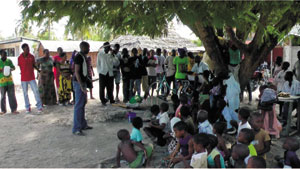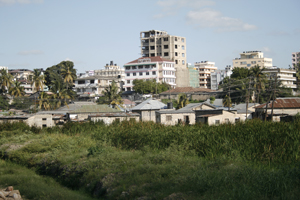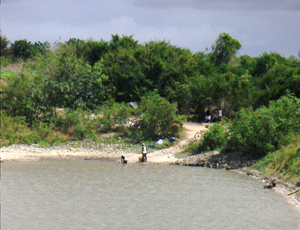Knowledge
Our first step is to build knowledge regarding people’s capacity to adapt to environmental change. This is the first building block that we need in order to develop, together with institutions, local actions that can reduce the population’s vulnerability to the expected consequences of climate change.
We consider the issue from three different points of view in order to have the fullest possible understanding of what is already occurring in the coastal plains of Dar es Salaam.
 |
We want to know how the inhabitants of peri-urban neighbourhoods are effected by the environmental changes already underway, and what their autonomous
adaptation strategies are for guaranteeing access to primary resources such as water and land.
It is also important to identify what problems, constraints, and obstacles people encounter when implementing their adaptation practices, as well as the opportunities they may find in the areas where they live.
|
 |
We want to know how the municipal officials responsible for environmental management and the planning of urban development are addressing the urban problems caused by climate variations.
We also want to know what knowledge and awareness they have of global climate change, and whether they are prepared to modify their strategies and procedures in order to account for the uncertainties surrounding the urban climate and natural resources of the future.
|
 |
We want to know how the environment is changing in the coastal plains of Dar es Salaam. We want data and information, new maps, and accurate surveys reflecting the current situation in the area in order to understand the real possibilities that the families settled there have of accessing water. We already know that many families use shallow wells in areas the public supply system does not reach or where water supply is intermittent.
We are therefore interested in identifying the level of salinization of wells over time, and the
advancement of seawater intrusion into the superficial stratum.
We are also interested in mapping the expansion of the city over time,
particularly in peri-urban areas, in order to have an idea of the progressing degree of water extraction from the superficial stratum and the number of families who run the risk of losing their access to water due to seawater intrusion.
|
Another fundamental step is the evaluation.
This phase is necessary in order to determine the appropriateness of the approach that has been adopted. This allows us to broaden our overall vision of the results obtained in the field, and increases our knowledge of the elements that comprise autonomous adaptive capacity.
The first predicted result is therefore knowledge building – regarding the population, local administrators, and the environment – which will allow for identification of elements that contribute to the development of adaptive capacity, and awareness of the obstacles that impede the adoption of new strategies.
Next, through the establishment of appropriate methodologies, we want to understand if and how the population, researchers, and administrators can interact in order to establish effective urban planning strategies that will support and reinforce the autonomous adaptive capacity of the families settled on the coast.
On the basis of such knowledge, we will be able to contribute to the development of new capacities for urban development planning.
The scientific results of the ACC Dar project, produced within the specific context of Dar es Salaam, may be useful to researchers and political leaders in other territories that are facing the same difficulties (i.e. planning for adaptation given the uncertainty of unforeseeable and irreversible transformations of the territory, caused by climate change and a series of non-climate factors, especially urban sprawl).